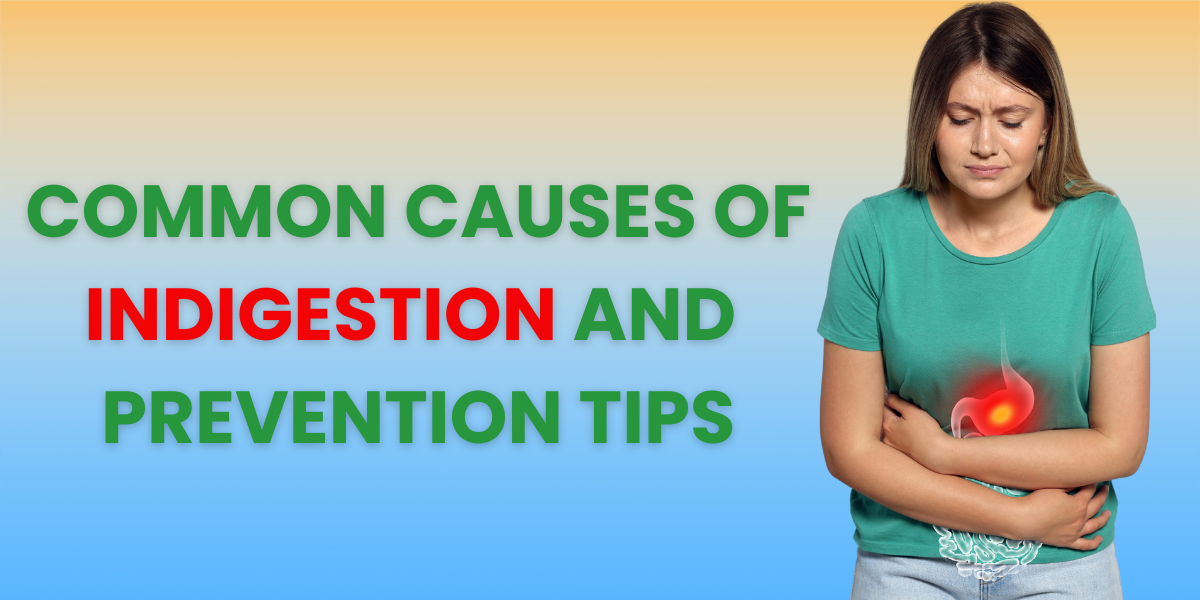Indigestion, also known as dyspepsia, is a common digestive disorder that affects millions worldwide. It often manifests as a feeling of fullness, bloating, discomfort, or burning in the upper abdomen. While indigestion is not usually a serious health issue, it can disrupt daily life. Understanding its common causes and how to prevent it can make a significant difference. This guide delves into the main triggers of indigestion and provides tips for prevention, along with recommendations for over-the-counter (OTC) medications that may offer relief.
Understanding Indigestion: What is It?
Indigestion occurs when the digestive system struggles to break down food effectively, leading to discomfort. It is a general term used to describe several digestive symptoms, such as nausea, bloating, and acid reflux. Causes can vary widely, ranging from diet and lifestyle choices to underlying medical conditions.
1. Dietary Choices That Cause Indigestion
One of the most common causes of dyspepsia is diet. Certain foods are more likely to trigger symptoms due to their high fat, acid, or spice content. Here are some foods often linked to indigestion:
- Fried and Fatty Foods: These can slow down digestion, causing bloating and discomfort.
- Acidic Foods: Citrus fruits, tomatoes, and vinegar-based dressings can irritate the stomach lining.
- Spicy Foods: For some people, spices like chili peppers trigger indigestion and acid reflux.
- Carbonated Drinks: Soda and sparkling water can cause gas and bloating.
- Caffeinated Beverages: Coffee, tea, and cola drinks may stimulate stomach acid production, leading to discomfort.
Prevention Tip: Avoid large portions of high-fat and spicy foods, especially close to bedtime. Opt for smaller, more balanced meals to ease digestion.
2. Lifestyle Factors Leading to Indigestion
Dyspepsia is not always about what you eat; how you live can also play a role. Key lifestyle factors that contribute to indigestion include:
- Eating Too Quickly: Rushing through meals doesn’t give your digestive system enough time to process food properly.
- Smoking: Smoking relaxes the lower esophageal sphincter, allowing stomach acid to flow back into the esophagus.
- Alcohol Consumption: Alcohol irritates the stomach lining and can lead to acid production.
- Lack of Exercise: Physical activity helps food move through the digestive tract, reducing bloating and constipation.
Prevention Tip: Take your time while eating, avoid heavy drinking, and incorporate regular exercise into your routine. Quitting smoking can also improve digestion significantly.
3. Stress and Anxiety’s Role in Indigestion
Mental health impacts physical well-being, and dyspepsia is no exception. Stress and anxiety can trigger or worsen indigestion by affecting how the body processes food and increasing stomach acid production.
Prevention Tip: Engage in relaxation techniques, such as meditation or deep breathing exercises. Managing stress effectively can go a long way in preventing indigestion.
4. Medications That Can Cause Indigestion
Certain medications, especially when taken frequently, can irritate the stomach and cause indigestion. Common culprits include:
- Nonsteroidal Anti-Inflammatory Drugs (NSAIDs): Ibuprofen and aspirin can irritate the stomach lining.
- Antibiotics: Some antibiotics may disrupt the balance of stomach bacteria, leading to indigestion.
- Iron Supplements: Iron can be hard on the stomach, causing nausea and discomfort.
Prevention Tip: If you suspect your medication is causing indigestion, consult with your doctor. They may suggest alternatives or advise taking the medicine with food.
5. Medical Conditions That Cause Indigestion
Occasionally, indigestion is linked to underlying medical conditions, including:
- Gastroesophageal Reflux Disease (GERD): Chronic acid reflux often presents as indigestion.
- Irritable Bowel Syndrome (IBS): This digestive disorder can cause symptoms like bloating, gas, and abdominal pain.
- Gastroparesis: In this condition, stomach muscles don’t work properly, slowing digestion and causing bloating.
Prevention Tip: If you experience frequent indigestion and suspect a medical condition, seek medical advice for an accurate diagnosis and treatment plan.
6. Effective OTC Medications for Dyspepsia Relief
While lifestyle and dietary changes are essential, over-the-counter (OTC) medications can provide quick relief from indigestion symptoms. Here are some commonly recommended options:
- Antacids: Antacids like Tums and Rolaids neutralize stomach acid, providing fast relief for mild symptoms.
- H2 Blockers: Medications such as ranitidine (Zantac) and famotidine (Pepcid) reduce stomach acid production.
- Proton Pump Inhibitors (PPIs): Omeprazole (Prilosec) and esomeprazole (Nexium) are more potent acid reducers and are effective for more persistent symptoms.
- Anti-Gas Medications: Simethicone (Gas-X) can help relieve bloating and discomfort caused by gas.
Note: Always follow the instructions on OTC medication labels, and consult a healthcare provider if symptoms persist or worsen.
Quick Tips for Dyspepsia Prevention
- Eat Smaller Meals: Large meals can overload the digestive system.
- Stay Upright After Eating: Lying down right after eating can lead to acid reflux.
- Chew Food Thoroughly: Digestion begins in the mouth; thorough chewing helps.
- Limit Trigger Foods: Identify and avoid foods that consistently cause symptoms.
When to Seek Medical Attention
If dyspepsia is frequent, severe, or accompanied by alarming symptoms (such as weight loss, persistent vomiting, or blood in stools), consult a healthcare provider. Chronic indigestion may signal a more serious health issue that requires treatment.
Conclusion
Indigestion can be uncomfortable, but understanding its causes and prevention strategies can help you manage or avoid symptoms. By making mindful dietary and lifestyle choices, managing stress, and using OTC medications when needed, you can find relief and enjoy better digestive health. Remember, for persistent or severe indigestion, seeking medical advice is the best course of action.





